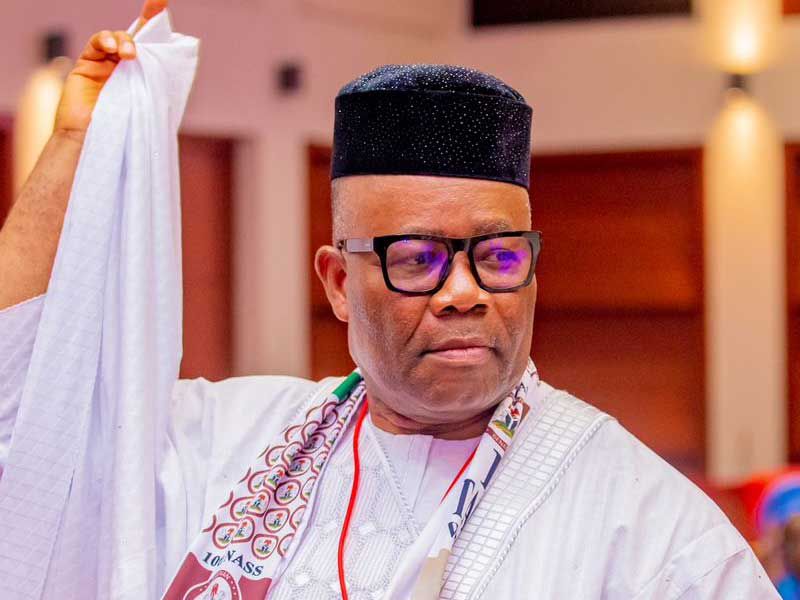
Godswill Obot Akpabio rose from humble beginnings to become one of Nigeria’s most prominent and controversial political figures.
He has served as governor of Akwa Ibom State, minister for Niger Delta Affairs, senator and, since June 2023, President of the Senate of the Federal Republic of Nigeria.
Who is Godswill Akpabio?
Senator Godswill Obot Akpabio is a lawyer and politician. He currently serves as President of the Senate representing Akwa Ibom North-West (Ikot Ekpene) and is a senior figure in the All Progressives Congress (APC). He first rose to national prominence as Governor of Akwa Ibom State (2007–2015).
Profile Summary
-
Full name: Godswill Obot Akpabio
-
Date of birth: 9 December 1962
-
State of origin: Akwa Ibom State
-
Local Government Area: Essien Udim / Ukana Ikot Ntuen
-
Ethnicity: Ibibio
-
Religion: Christian
-
Marital status: Married to Mrs Ekaette Unoma Akpabio
-
Political party: All Progressives Congress (APC), previously PDP
-
Current position: President of the Senate of Nigeria since 13 June 2023.
-
Years active in politics: Active since the early 2000s (commissioner roles before 2007 governorship).
-
Estimated net worth: Widely reported estimates vary; some outlets list figures up to $100 million, though such estimates are not officially audited and should be treated as unverified.
Early Life and Education
Godswill Obot Akpabio was born in Ukana Ikot Ntuen, Essien Udim Local Government Area of Akwa Ibom State. He lost his father at a young age and was raised by his mother, Lucy Obot Akpabio, who is often credited with instilling the values he frequently references in public addresses.
Akpabio attended Methodist Primary School, Ukana, and Federal Government College, Port Harcourt. He later studied law at the University of Calabar and was active in student government, reportedly serving as Student Union Government (SUG) Speaker during the 1987/88 academic year. He qualified as a lawyer before entering public service.
Career Before Politics
Before his first major public office, Akpabio worked as a lawyer and held various public service roles. In the early 2000s, he served in Akwa Ibom State’s cabinet as Commissioner for Petroleum and Natural Resources and later as Commissioner for Lands and Housing and for Local Government and Chieftaincy Affairs.
The Commissioner Roles in Succession:
-
Commissioner for Petroleum and Natural Resources (2002–2003).
-
Commissioner for Local Government and Chieftaincy Affairs (2004–2005).
-
Commissioner for Lands and Housing (2005–2006).
These roles helped build his profile and political network in the state, positioning him for a run for governor.
Political Career
Entry into Politics
Akpabio formally entered elective politics in the mid-2000s. He won the People’s Democratic Party (PDP) primary and was elected Governor of Akwa Ibom State in 2007. He won a second term in 2011, serving two terms as governor through 2015. His administration promoted large-scale infrastructural projects, a record that supporters call “uncommon transformation.”
Major Political Roles
-
Governor of Akwa Ibom State (2007–2015): Akpabio’s two-term governorship focused on road projects, public works and civic buildings. His style was visible and infrastructural. Supporters praise the public works; critics and some civil society groups later questioned procurement transparency.
-
Senator (2015–2019; 2023–present): After leaving the governor’s office, Akpabio was elected to the Senate in 2015 and again in 2023 to represent Akwa Ibom North-West. In June 2023, his colleagues elected him President of the Senate.
-
Minister of Niger Delta Affairs (2019–2022): Appointed minister in 2019, Akpabio was tasked with projects in the oil-producing Niger Delta, including efforts to reform the Niger Delta Development Commission (NDDC). His tenure was controversial and included public hearings and disputes over contract management at the NDDC. He resigned in mid-2022 to re-enter elective politics.
Personal Life
Akpabio is married to Ekaette Unoma Akpabio; the couple are public figures in Akwa Ibom social life and politics. He frequently highlights family and faith in speeches. Public profiles show he maintains a visible social and political life across the Niger Delta and Abuja.
Net Worth and Assets
Public estimates of Akpabio’s wealth vary widely. Some Nigerian media outlets and online listings have placed his net worth in the tens of millions of dollars (one popular figure cited is $100 million), but these are not official valuations and should be treated as estimates rather than audited facts.
Akpabio’s declared assets when in public office have been a subject of media attention and public debate, and some anti-corruption groups have pushed for transparent asset declarations and investigations.
Notable Quotes
1. “Let God’s will be done again”
This was his 2011 declaration speech for his re-election as Governor of Akwa Ibom State. Akpabio used his name, Godswill, to create a memorable spiritual and political message
2, “Uncommon transformation”
This was the central slogan for Akpabio’s administration during his two terms as governor of Akwa Ibom State. Even years after he left office, the phrase is still frequently used by his supporters to describe his legacy of infrastructural development in the state.
Recent News and Updates
-
Senate Presidency: Akpabio was elected Senate President on 13 June 2023. His leadership of the Senate has been high-profile and influential in national legislative affairs.
-
Corruption probes and EFCC: Akpabio has faced invitations and probes by anti-graft agencies over allegations tied to his time as governor and minister. Some investigations were reported, others remain unproven; he has at times publicly pushed back against allegations. Media outlets have covered EFCC interest and parliamentary inquiries.
-
Sexual harassment allegations: In 2020, a former acting Managing Director of the NDDC, Joy Nunieh, accused Akpabio of inappropriate conduct while he was minister. More recently, in 2025, Senator Natasha accused him of sexual harassment, and the matter drew significant national media attention and debate about parliamentary processes and how such complaints are handled. These remain allegations and are the subject of public and institutional scrutiny.
Achievements and Impact
His legacy is still being written: supporters emphasise transformation and delivery; critics emphasise accountability and unresolved allegations.
